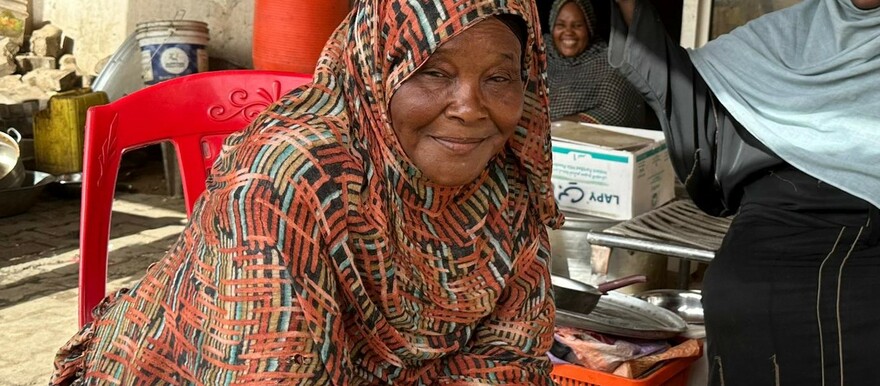Fatima Inqaz, a resilient street food vendor and proprietor of a popular local restaurant on Street 15 in the Al-Amarat suburb of Khartoum, shares her story with a smile, with an ever inviting smile on her face and lips. “My name used to be Fatima Inqaz, but after the war, I became Fatima Shaab,” she begins.
Expressing her deep connection to Khartoum, Fatima emphasizes, “Khartoum is my soul and my spirit, and so is my restaurant here. Despite urging from friends and acquaintances to leave for Egypt or elsewhere, I refused. I love Sudan, and I’m determined not to leave, not even an inch. May Allah protect those who have left, and I hope for their safe return. My wish is to reunite in Khartoum and return to our homeland.”
Reflecting on the significant losses endured, Fatima remains hopeful for the return of all Sudanese in the diaspora, regardless of their current location. “Our country’s loss is profound, but my sole desire is for our collective return,” she states. “For Sudanese worldwide, whether in America, Qatar, Egypt, or elsewhere, coming back home is all I wish for.”
When conflict erupted in Khartoum, Fatima was battling malaria, confined to her home in the Al-Azhary neighbourhood, incapacitated by fever. “I was very ill and barely conscious,” she recalls. “My sons had to carry me to a cart, and we journeyed towards Al-Gazeera State, settling in the Al-Masoudiya area at the home of an old neighbour.”
Fatima briefly returned to her Khartoum home on the second day of Eid al-Fitr, but relentless clashes forced her and her family back to Al-Gazeera via Madani Street. However, the escalating conflict in the area compelled them to change course towards the eastern road.
Describing her journey on the eastern road as gruelling and exhausting, Fatima spent a month with an acquaintance in the Al-Mazad neighbourhood of Wad Madani, Al-Gazera State. Shortly after, she secured a rental house in the Hantoub suburb and reopened her restaurant in the Al-Gamarik area, with the generous assistance of her neighbour, Hajja Al-Zahou, who provided all the necessary restaurant equipment.
During this time, a chance encounter with a regular customer from Khartoum shed light on the challenges Fatima faced. Upon learning of her struggles with capital, the customer generously offered to invest, enabling Fatima to expand her restaurant business.
War strikes again!
“Once we settled and resumed work, my sons and I came to terms with our losses in Khartoum and found contentment,” Fatima recounts. “But the conflict persisted, reaching Al-Gazera,” she continues. “When chaos erupted, I was at the restaurant. Suddenly, panic ensued, and people began running. Sensing danger, I decided to leave. My son arrived, and upon inquiry, he informed me that the war had indeed reached Al-Gazera.”
“We exhausted all our savings there,” she laments. “I rented a house, purchased furniture, and set up the restaurant. This drained our resources, leaving me unable to afford a rental in Kassala State. I invested heavily during the establishment phase in Madani city, and when we had to flee, I found myself penniless once again, much like when we left Khartoum.”
Sharing her stories of her restaurant venture in Khartoum, Fatima explains, “My restaurant in Khartoum is quite spacious, with four stalls and two warehouses stocked with various raw materials like beans, oil, lentils, flour, gas, and more. It boasts six refrigerators and approximately 25 gas cylinders, among other amenities.”
She elaborates on her three-decade journey, stating, “This restaurant represents 32 years of hard work in Khartoum. It encapsulates my life’s struggle, but Alhamdulillah, everything has turned out for the best.”
Reflecting on the losses incurred in Al-Gazera State, Fatima recounts, “I had invested significantly in supplies for a shop in Madani city, including lentils, beans, oil, gas, flour, liver, and other essentials, with prices starting at one million Sudanese pounds.”
Upon leaving Al-Gazera for Kassala State, Fatima left behind all personal belongings and restaurant assets. Settling in one of the sheltering houses in Kassala, she expresses gratitude for the warm reception and hospitality extended by the local community. She emphasizes that they felt completely welcomed and at home amidst the people of Kassala.
Fatima has embarked on a new chapter in Kassala, where she, alongside her family members, has opened a new restaurant. With each meticulously prepared local dish, she serves up not just food but also a touch of hope and love, all while carrying a smile on her face, yearning for the day she can return to her home and restaurant in Khartoum.
Not content with merely focusing on her own business in Kassala, Fatima also lends a hand in the kitchen of the sheltering house where she resides. “I work here in the kitchen, overseeing the preparation of all meals from breakfast to dinner,” she shares. “I’m impressed by the dedication of the young people working here to assist those at the center.”
Despite making good progress in her endeavours, Fatima acknowledges the challenges posed by the scorching temperatures, particularly during Ramadan. Yet, she remains dedicated to preparing meals for suhoor and iftar, reminiscent of her Ramadan traditions back in Khartoum.
Fatima, a mother of three sons and a daughter, with several grandchildren, now calls one of the sheltering houses in Kassala State her home. Alongside her children, other family members, and relatives, she finds solace in their company amidst their new surroundings.
This text is part of a collection of personal testimonies produced by Radio Tamazuj as part of a series of survivor accounts in Sudan. If you or someone you know has a story to tell, please contact us.




